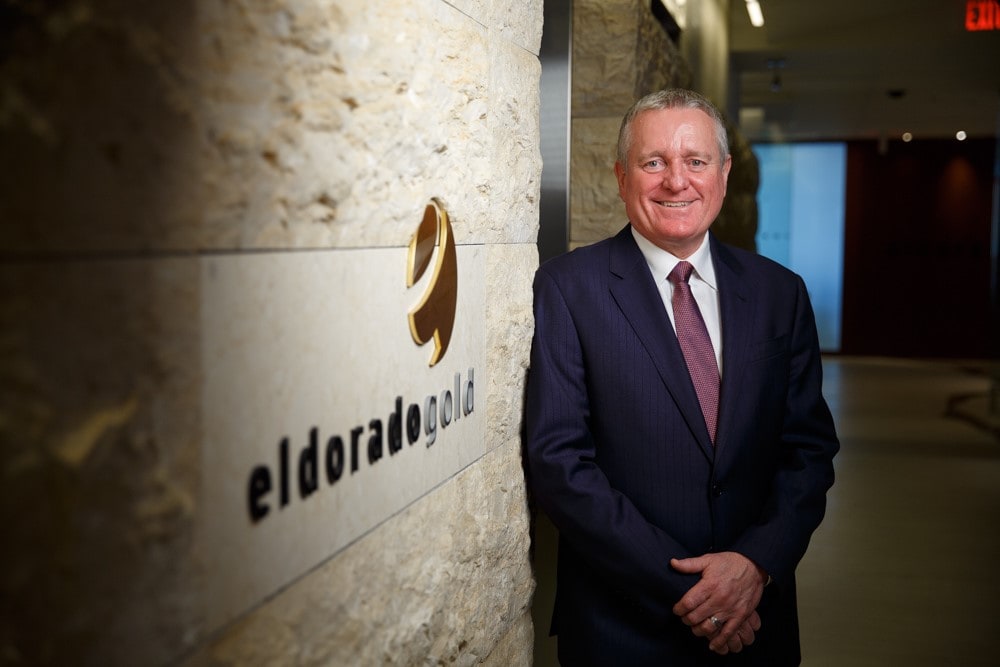
It’s been a year since George Burns took the helm as President & CEO of Eldorado Gold. As an industry veteran with over 40 years of experience in the mining industry, George knows what it takes to build projects that create value for all stakeholders. With the release of Eldorado’s 2017 sustainability report “Tomorrow, Together”, George has taken some time to share his thoughts on sustainability in the mining industry and the importance of working with all our stakeholders to achieve common goals.
Corporate social responsibility has evolved considerably in the 40 years you have been involved in mining. How does the modern mining industry contribute to sustainable development?

Our modern world would not exist without metals – our energy, transportation, communication and healthcare systems rely on them. While there is a movement towards recycling used metals for new purposes, the reality is that for the foreseeable future we need to continue mining additional metals for our world to function. The question is: how do we mine responsibly? Progressive mining companies must develop the metals that underpin our world in a sustainable way. That means minimizing impacts on local communities and the environment, and bringing positive benefits to people whose lives our operations touch. It also means ensuring our activities leave a legacy of value beyond the life of our mines.
What is Eldorado’s approach to sustainability?

Our approach is holistic. Sustainability is embedded in the design of all our projects – from the exploration phase through to mine closure and reclamation. We look at the potential impacts of our actions on people, communities and the environment. We then look at ways to mitigate those impacts.
We also recognize that mining is an inherently social venture, and that trust, honestly and transparency are fundamental to every relationship we have with our stakeholders. That is why we constantly work to engage with local communities to find ways that we can help them achieve their goals. By investing in the social, economic and cultural well-being of our communities, we can create lasting value beyond our mines.
Can you tell us more about how Eldorado helps build stronger communities?

Eldorado has historically supported three pillars of sustainability: infrastructure, health and education, due to their wide-ranging social benefits. When we go into new jurisdictions, we take the time to develop a solid understanding of the circumstances and needs in each community. Only then can we put a plan in place to help fill some of those gaps and provide investments and support that are fit for purpose.
This was our approach in Turkey, where we learned through discussions with our community partners that there was an educational gap. Our continued and long-term investments in education – ranging from facilitating nursery school classes through to building a 42-classroom building at Üsak University – have had a significant and long-term positive impact on individuals and their communities. When we first began helping students from the communities near Efemçukuru attend high school in 2006, there were three students enrolled in the school. Today, with our support, enrolment has grown to 57 students in 2017. An additional 11 students from the area are attending university through programs supported by Eldorado, while others have graduated and now work at our mine.
What is Eldorado doing to strengthen local economies?
Developing supplementary businesses, like vineyards at Efemçukuru in Turkey or the Olympias nursery in Greece, are prime examples where Eldorado has helped support local business opportunities. At Efemçukuru, roughly 30 people are employed at the 20 hectare vineyard and 16 hectare olive grove, producing 2,000 tonnes of table grapes, 15 tonnes of wine grapes and 120 tonnes of olives in 2014.
Projects like this are an excellent example of how we have worked with local partners to create jobs and parallel businesses that diversify economies and support communities. Again, I think the key is finding out what the community’s needs are and being able to offer opportunities to fill those gaps.



